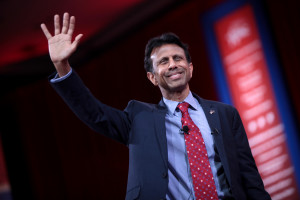
As Asian Americans become more prominent in American politics, candidates from the community have come from both the left and the right. One who just announced a run for president has chosen to distance himself from the community and the concept of the “hyphenated” American.
Louisiana Governor Bobby Jindal has publicly stated on various occasions that he doesn’t believe in hyphenated Americans. That such titles are divisive and strong ethnic identities are a barrier to assimilation in the United States. That’s not surprising since Jindal whose given name is Piyush, adopted the name of the youngest boy from the Brady Bunch at the tender age of 4. Speeches he’s made, one specifically in London earlier this year, are confusing. In his speech to the conservative Henry Jackson society, he promoted ideology consistent with sanitizing one’s ethnic heritage into something more “Americanized”. At the same time, he denies that he’s advocating that immigrants abandon their cultural and religious roots, as reported by Politico.
“Over time, a different philosophy has crept in, and that philosophy now dominates the thinking of the American left, and perhaps even the mainstream of thinking in Europe,” Jindal said. “This philosophy holds the view that it is wrong to expect assimilation — that assimilation is colonialist, assimilation is backward and assimilation is in fact evidence of cultural bigotry and insensitivity.”
Over the course of his political career, Jindal, a Brown educated Rhodes Scholar, has continually distanced himself from his Indian roots by using ethnic pride to attack liberal ideology. Embraced by the Indian American community, Jindal garnered support among huge swaths of the community early in his career. But as his national profile grew, he further distanced himself from the Indian American community. Much of Jindal’s position on his ethnicity has led one political science professor in Louisiana to say, “there’s not much Indian left in Bobby Jindal.”
Jindal’s political ideology isn’t much different from other conservative GOP candidates for President. He’s opposed to same-sex marriage, abortion rights, anti-discrimination laws, and vows to replace the Affordable Care Act if he is elected to the nation’s highest office. He believes humans contribute to climate change on some level, and promotes investment in green energy while supporting the construction of the Keystone XL pipeline meant to transport oil from Canada to the Gulf of Mexico. Originally in favor of Common Core, Jindal has reversed course in the past couple of years and gone so far as to sue the federal government for trying to force states to adopt the new education curriculum with federal dollars. Like most Republican contenders, Jindal is a staunch defender of gun rights, cutting taxes and spending, teaching intelligent design in public schools, while leaving options open to sending military support to fight Islamic extremism in the Middle East. He has long talked of protecting Americans from Muslim immigrants seeking to impose Sharia law in the U.S. and promotes selective immigration reform which would allow a pathway to citizenship to some undocumented people while banning immigration of Muslim extremists.
Many of his encounters with national media have been less than stellar. Jindal delivered the GOP rebuttal to President Obama’s first State of the Union address in 2009 which was largely panned by major media as amateurish, campy, and he was likened to characters on television sitcoms. More recently, the official portrait of Jindal in Louisiana was publicized with a noticeable lightening of Jindal’s skin color. Time Magazine analyzed the larger implications of how lightened skin tones reflect a historical desire to “Americanize” political figures, and question whether that standard still exists in present day society.
Since Jindal announced Tuesday his candidacy for President, analysts wonder if his notoriety in 2015 can eclipse that of 2012, when political experts believe he had a better chance of winning the party’s nomination. His popularity in Louisiana has plummeted since the last presidential race, and he is polling near bottom in New Hampshire, one of the country’s first primaries. The field is crowded with more than a dozen candidates for the GOP nomination, and more announcements are anticipated in the coming weeks. Without a strong showing in the polls, it is doubtful Jindal will make the stage in the first debate scheduled for August.

